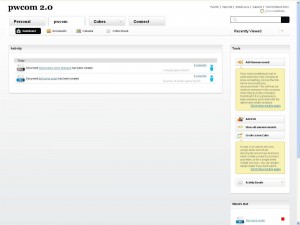 In early 2007, I wrote about BT Workspace, a Software-as-a-Service that the UK telecoms giant was offering to small and medium-sized businesses. Built on a modified version of the Microsoft SharePoint platform by US company SMBLive, BT Worskspace offered extranet-type project workplaces at a competitive price (£7.50 per company user per month; free for micro-teams of two), though I didn’t believe it posed a serious threat to the main construction extranet or collaboration platform providers (too many issues about collaborating on CAD drawings, version control, managing contractual processes, etc).
In early 2007, I wrote about BT Workspace, a Software-as-a-Service that the UK telecoms giant was offering to small and medium-sized businesses. Built on a modified version of the Microsoft SharePoint platform by US company SMBLive, BT Worskspace offered extranet-type project workplaces at a competitive price (£7.50 per company user per month; free for micro-teams of two), though I didn’t believe it posed a serious threat to the main construction extranet or collaboration platform providers (too many issues about collaborating on CAD drawings, version control, managing contractual processes, etc).
However, BT is going to be closing the Workspace service down from 20 November 2009, and SMBLive is collaborating with a London-based company, Glasscubes (formed a year ago), to provide an alternative service. According to the news release:
Glasscubes offer the same features as BT Workspace – private workspaces to share documents, calendars, tasks and discussions, a branded online place to manage projects and centralise customer data (contacts, sales leads and issues). In addition to these functionalities Glasscubes also provides free conference calls, a higher level of storage and most importantly, people who you can speak to if you have difficulties.
Pricing
Looking at the website, Glasscubes’ four main service offers are online collaboration, project management, contact management and intranet solutions. Pricing-wise, there is a free entry-level package for up to three users, which include two project work spaces (“Cubes”, of course), up to 100MB of storage and capacity for 100 contacts. The ‘small’ business package, priced at £15, allows any number of users, up to 10 Cubes, 4GB of storage space and 5000 contacts.
Simple, intuitive interface
 I’ve had access to a Glasscubes account. The interface (right) is attractively bare and intuitive to use (with yellow help panels to explain functionality just in case you’re not sure); within seconds you can start customising your site, adding a logo and changing the colour scheme. Collaboration is straightforward: inviting colleagues to the site, creating cubes, and uploading files to share is easy. There is also a whiteboard into which you paste text, words, etc and create new documents or work collaboratively. And, there is also a conference call service for which users only pay the cost of the telephone call.
I’ve had access to a Glasscubes account. The interface (right) is attractively bare and intuitive to use (with yellow help panels to explain functionality just in case you’re not sure); within seconds you can start customising your site, adding a logo and changing the colour scheme. Collaboration is straightforward: inviting colleagues to the site, creating cubes, and uploading files to share is easy. There is also a whiteboard into which you paste text, words, etc and create new documents or work collaboratively. And, there is also a conference call service for which users only pay the cost of the telephone call.
When I looked at the calendar feature, I was hoping I would be able to import meetings from my Google or Outlook calendars, but this doesn’t seem to be supported (yet) in Glasscubes. Another nice-to-have would be some kind of integration with micro-blogging, perhaps Twitter or maybe Yammer for internal-only exchanges.
However, that grumble aside, from a collaboration/file-sharing/project management, there is much to like about Glasscubes, and it is inexpensive too – vital in a competitive market. Already this year, I’ve talked about several free or low-cost collaboration solutions (e-Grou, Incite Toolbox, ShowDocument, drop.io, Clouds UK, Woobius, Colaab), some of which are more focused on the AEC sector, others are more generic. What might help differentiate Glasscubes is its support for small businesses in developing new sales leads.
CRM
From my perspective as a marketing professional, Glasscubes also has potential as an inexpensive customer relationship management (CRM) system for SMEs. Its online contact management system, Glasscubes Connect can be used to manage tasks associated with contacts, and to track sales opportunities or customer issues. I experimented by trying to importing a CSV file of a small subset of my contacts, but got an email saying their appeared to be a problem (apparently, it’s best to import a CSV that fits with the provided template). That hurdle overcome, I saw how opportunities and issues can be created and tracked (you can imagine how, say, a small architects practice could combine the document sharing features with the CRM toolset to keep on top of project management issues) , and there are simple reporting tools showing pipeline and work lost/won. (Read more about Glasscubes Connect in this ReadWriteWeb review).







2 pings
[…] might be used by businesses in the architectural, engineering and construction (AEC) industry (eg: Glasscubes, e-Grou, Incite Toolbox, ShowDocument, drop.io, Clouds UK, Woobius, Colaab). Even the deepest […]
[…] market, including e-Grou, Incite Toolbox, ShowDocument, drop.io, Clouds UK, Woobius, Colaab, GlassCubes, Collabor8-online and FileGenius (and there are many more; just look at this Wikipedia list) […]